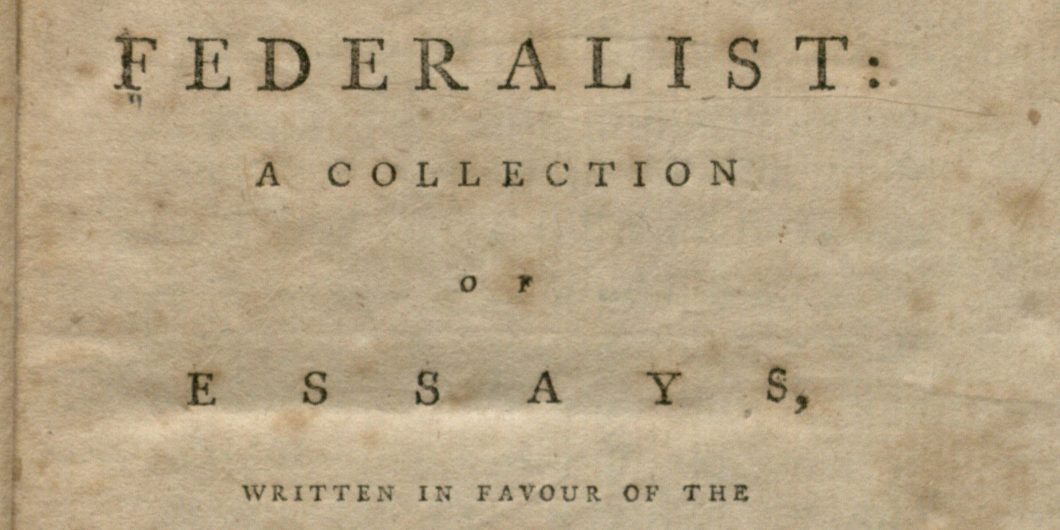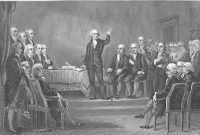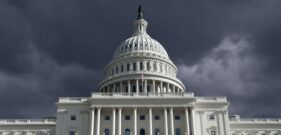The opponents of the Electoral College, in attempting to undermine support for the institution, have painted it with an unfair half-truth.
The Enduring Publius
A cottage industry exists around analyzing The Federalist. The scholarly literature is so extensive that finding something fresh to say about the work could prove a Herculean task. The essays in Will R. Jordan’s edited collection, From Reflection and Choice: The Political Philosophy of the Federalist Papers and the Ratification Debates, reveal, however, that scholars continue to raise important questions that need answering.
From Reflection and Choice contains nine essays, all by political theorists. Divided into two sections, “The Founders’ Project” and “Legacy and Applications,” the range of authors and topics is impressive. Too large and impressive, in fact, to detail in a review, so this essay will provide only summaries before offering thoughts about the volume as a whole.
Reflections on Publius
Michael Zuckert opens the collection by exploring the “essentially Lockean” foundations of the American order, presenting the protection of natural rights and property as central to that foundation. He explores Madison’s political thought and why that important Founder believed the Constitution’s “institutional republicanism” protected and preserved a natural rights republic rooted in property. Murray Dry follows Zuckert’s theory-heavy essay with a historical exploration of the clash between Federalists and Anti-Federalists over the nature of federalism. Dry contends that, although the Constitution “brought a new form of federalism into being,” the debate over the nature of federalism did not end with the Constitution’s ratification. Rather, the nature of the Constitution’s representation and murky demarcation between federal and state power assured the debate would persist after ratification. Focusing on Madison during the 1790s, Dry concludes that his focus on the state ratifying conventions and the “moderate” nature of Congress’ powers led him to oppose Alexander Hamilton’s economic scheme as antithetical to republican government and Congress’s limits.
Madison remains the focus of the next two essays by Lynn Uzzell and Jeremy D. Bailey, respectively. Uzzell’s intriguing but dense essay explores the most famous Federalist essay, Federalist 10. In an intensely close reading of the essay and comparison to Madison’s other writings from the era, Uzzell holds that Madison made three arguments for an extended republic: multiplicity of factions to keep majoritarian tyranny in check, the election of superior representatives, and the logistical difficulty of factions forming a majority. She notes that scholars have elevated the first of these beliefs to the primary spot in Madison’s thought. Uzzell’s reading, however, demonstrates that Madison placed the multiplicity of interests and election of superior representatives on equal footing, and considered the logistical issue as nearly equal to the others. Yet, as she points out when exploring Madison’s other writings on the extended republic, point two, the election of superior representatives, is nowhere to be found. Uzzell argues that Madison equated the multiplicity of interests and the election of superior representatives in Federalist 10 as a rhetorical strategy to assuage Anti-Federalists’ concerns about the size of the republic.
Bailey’s essay, by contrast, concentrates on whether Madison’s Federalist 39 essay explained how “to make a nation” and at the same time “defend the rights of Virginia.” Bailey argues that although Federalist 39 suggests an impatience “with, or skepticism of, arguments that began from the premise of sovereign states,” Madison’s “later explications of the Constitution” often “[go] further toward a stronger notion of state sovereignty.” To flesh out this claim, Bailey explores how Madison relied upon the terms used at the time of the ratification debates rather than contemporary—and, to Madison, novel—interpretations. This explains the great Virginian’s views of slavery and his defense of interposition in the Virginia Resolution. Bailey then shifts to the focus of his essay: Madison and the federal judiciary. Here, Bailey contends that Madison believed in a “doctrine of judicial finality” regarding federalism questions. Madison believed that the ratification debates established boundaries of power and all but made inevitable the clashes of local and national constituencies. Since federal judges lacked constituents, they could act as the impartial umpires. Although the federal judiciary is absent in Federalist 39, Bailey notes that, ultimately, “the fact that the national judiciary would be determining the meanings of the boundaries” of federal and state power “is less important than the fact that there are boundaries.”
Returning to the Constitution’s plain language and understanding as explicated by Publius offers some hope of restraining Leviathan.
Kimberly Hurd Hale rounds out the first section by shifting the focus away from Madison and to Hamilton. Hale makes the intriguing claim that Hamilton “can be viewed as an adherent to [Francis] Bacon’s vision for the possibility of a deliberately planned, scientifically grounded political society.” Concentrating on Hamilton’s arguments in the early Federalist essays, in which he explained the scientific formation and deliberate choice needed to ratify the Constitution, the need for a commercial republic, and his desire for a militarily potent United States, Hale argues that these points were all Baconian in nature. To defend her position, she juxtaposes Hamilton’s thought alongside passages of Bacon, and the similarities are striking.
The second section moves away from the Founding to concentrate on what it calls the “Legacies and Application” of The Federalist and ratification debates. No scholarly work by political theorists on the Founding would be complete without an essay on Abraham Lincoln. Jon Schaff’s piece fills that requirement by exploring the supposed statesmanship of the sixteenth President. Schaff contends that Lincoln “overcomes the Federalist/Anti-Federalist divide by showing that while proper institutions and virtue are necessary, both must be taken care of by the statesman.” Lincoln achieved transcendence, Schaff claims, because he practiced moderation and prudence.
Roger Barrus’s much more effective essay maintains that “there was something crucial missing from the ratification debate,” namely a “discussion of the good of democratic self-government.” The Anti-Federalists failed to force this discussion during the debate, and the Federalists declared the Constitution self-governing without showing how self-government was a good thing. The failure to have this conversation at the founding, Barrus notes, becomes readily apparent in our modern understanding of federalism. While Americans today are “peculiarly inconsistent Anti-Federalists,” they believe the answer to their problem with the federal government can be answered only by giving the federal government more power. Only by returning the Constitution’s “dual sovereignty federalism” that celebrated the real diversity found in diverse places can our Constitutional maladies finally be cured.
Elizabeth Kaufer Busch’s essay on the separation of powers and the “normalization of tyranny” may dampen Barrus’s hopes. Her essay, which is perhaps the best in the entire collection, explores the numerous ways, through the Office of Civil Rights and Title IX especially, the unelected administrative state centralizes power. These agencies and their rules, she notes, violate the separation of powers, the ability to self-govern, and the “end-goal” and procedural processes of the rule of law. Returning to the Constitution’s plain language and understanding as explicated by Publius offers some hope of restraining Leviathan.
Karl Walling’s final essay in the collection explores American grand strategy. Walling argues that the Founding, the Constitution, and The Federalist (although he does discuss other documents such as Washington’s Farewell Address and the Monroe Doctrine) represent what he calls the “Old Testament” of American grand strategy. Six pillars of faith defined this Old Testament: liberty, independence, energetic and republican institutions, non-intervention, and counter-intervention. Emerging in the early 20th Century, this New Testament places salvation in collective security through international cooperation such as NATO or the UN. Prophesized first by Woodrow Wilson, “the John the Baptist” of this New Testament, it became the great commission of Franklin Roosevelt, Harry Truman, and other Cold Warriors to spread this gospel to the United States and the world. Walling argues that these preachers of this new gospel did not come to replace the old law but to fulfill it. Rather than rejecting Founder’s grand strategy, this new version globalized American beliefs and the idea of republican security theory. In fact, “disciplines of the New Testament are not without grounds to argue that they are more faithful to the spirit of the Old Testament than the fundamentalists, however.”
Methodological Choices
From Reflection and Choice is a solid and thought-provoking collection of essays. Yet several issues mar the collection. First, too many essays are frustratingly condensed, leaving the authors’ thoughts half-expressed—almost as if the publisher refused to go beyond a specific page limit. Bailey’s essay exemplifies this problem. Madison’s argument that courts should be neutral umpires is convincing but stops almost as soon a Bailey makes it. This abrupt ending leaves his essay open to criticisms that it might have headed off with more space. If, for example, Madison believed the federal courts had the final say in questions of federalism, why did Madison not include this belief in the Virginia Resolutions, his most famous defense of state sovereignty against federal encroachment? Was it due to his not wanting to upset Jefferson and his blunt assessment of the federal judiciary? Was the direct threat to liberty posed by the Alien and Sedition Acts too substantial to leave only to the Courts? If interposition is a “duty,” as Madison claims, at what point do states relinquish this duty to the court? No doubt Bailey can offer answers to these questions, but since the essay breaks off just as he starts making his actual argument, it limits an otherwise fine contribution.
My second, and more general criticism, focuses on methodology. Too much of the first section is Madison-centric. Other than one essay about Hamilton, the book’s first section ignores the other Federalist authors. Jay’s only serious appearance comes in Walling’s piece. This focus on Madison transforms the book’s first section into the great Virginian’s political philosophy more than The Federalist’s. Having an essay about Hamilton’s misjudgment about the federal judiciary or Bill of Rights, for example, would have added an excellent follow-up topic to Bailey’s article, while Jay’s discussion of the nature of the union versus that of the Anti-Federalists are natural topics that the book ignores at the expense of Madison.
Two other methodological issues in Uzzell and Hale’s essays warrant mentioning. Despite Uzzell’s opening sentence, insisting (rightly) that “[t]oo often, the Federalist essays are examined as though they were a philosophical treatise rather than rhetorical discourse,” the entire essay treats Federalist 10 as if it were a treatise written with deep reflection and time for contemplation. She ignores the context of how Madison—Jay and Hamilton, too—wrote in haste and against tight deadlines, which suggests that the need to counter Anti-Federalist arguments about large republics may have outweighed philosophical consistency or refined rhetorical strategies. While making an intriguing and potentially ground-breaking argument, Hale’s essay offers no evidence of Hamilton’s familiarity with Bacon. At best, then, the connection is one of similarity rather than influence. This is no different from saying that because the Founding generation believed in the will of the people, then the American Revolution must have been a Rousseauian moment. While I am more than willing to believe Bacon may have influenced Hamilton, Hale needs to establish a direct connection.
My final methodological point concerns Schaff’s essay on Lincoln. It is the real outlier of this collection in no small part because it offers the Lincoln of myth rather than the Lincoln of history. Schaff’s contention that Lincoln’s prudence and moderation moved beyond the Federalists and Anti-Federalists hints very strongly that no other political figure before (or since) practiced those two traits. If those are the criteria to lighten a path left dark by the Ratification debates, surely Washington’s example better fits that mold. Also, it is unclear if the Lincoln who arrested northern political opponents, pacifists, a Congressman, and a sitting federal judge, held military tribunals for citizens, unilaterally suspended Habeas Corpus, called up troops, and spent unauthorized monies can be said to have “showed admirable restraint.” At the same time, moreover, the centralized banking, high protective tariffs, massive land giveaways, income taxes, and internal improvements approved by Lincoln whiffs quite strongly of the encroaching centralization the Anti-Federalists predicted under the Constitution. “Emergency” justifications aside, is this the model for a statesmanship that “moves beyond” Federalists and Anti-Federalists? If so, I might take my chances with the unenlightened Publius or Brutus.
From Reflection and Choice only scratches the surface of the enduring importance of The Federalist and the ratification debates but can serve as a starting point in further explorations of the topics. Research is still needed on linking the immediate context of 1787-1788 to the content, nature, form, and influence of Publius’ arguments. In addition, by contrasting Madison’s and Hamilton’s visions for the federal judiciary in both The Federalist and the political scrapes of the 1790s, scholars could explain more about the controversies involving the federal courts in the Early Republic. Finally, constitutional historians, legal scholars, and political theorists still must consider thorny topics raised by The Federalist such as the authority of the ratification debates for constitutional interpretation, the place of virtue in the new constitutional order, and the reasons for the differences between Federalist and Anti-Federalist definitions of republicanism. From Reflection and Choice prompts further thought on these and many other important issues.



